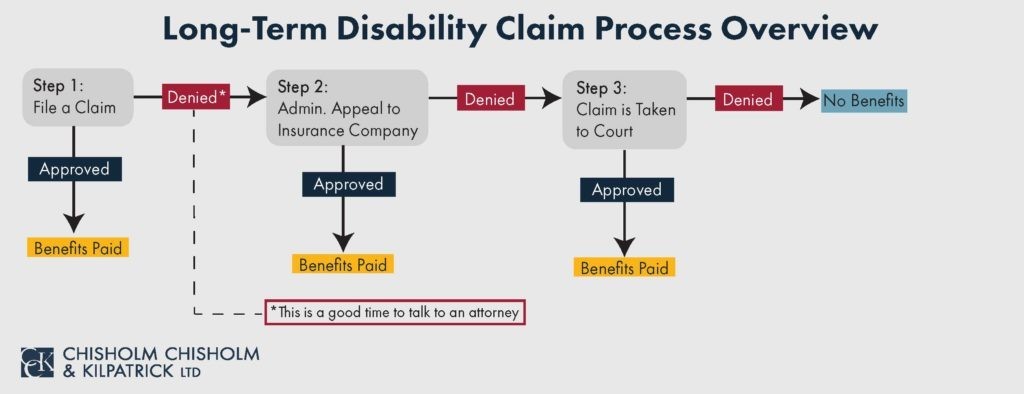Long-Term Disability (LTD) Benefits for Carpal Tunnel Syndrome

Carpel tunnel syndrome is a common condition that can cause pain, numbness, and tingling in a person’s hand or arm. As such, when a person suffers from this condition, it can become difficult to perform the duties of their job. In these situations, it may be necessary to apply for long-term disability benefits (LTD). These benefits are meant to protect a percentage of your pre-disability earnings when you become unable to work for an extended period due to an illness or injury.
However, obtaining these benefits can be challenging. Insurance companies, such as Unum and Humana, deny LTD claims often. While every insurance company should handle all claims neutrally, this is not often the case. This article will discuss carpal tunnel syndrome’s effect on a person’s ability to work; whether such a condition can qualify for long-term disability benefits; and what to expect when filing a disability claim with the insurance company.
What Is Carpal Tunnel Syndrome?
Carpal tunnel syndrome is a condition that causes pain, numbness, and tingling in the hand or arm. The condition occurs when the carpal tunnel in the wrist becomes narrowed or when tissues swell, causing the median nerve to be squeezed as it travels through the wrist.
Carpal tunnel syndrome can be the result of a multitude of factors, including repetitive hand use; activities that involve extreme wrist flexion or extension for prolonged periods; heredity; pregnancy; and other health conditions such as diabetes or rheumatoid arthritis.
Diagnosing and Treating Carpal Tunnel Syndrome
Carpal tunnel syndrome tends to get worse over time, so early diagnosis and treatment are important. Further, if not treated, carpal tunnel syndrome can result in permanent nerve damage.

A doctor may perform a physical exam or utilize EMGs; nerve conduction studies; or ultrasounds to diagnose your carpal tunnel syndrome.
Carpal tunnel syndrome can be treated both operatively and non-operatively. Nonoperative treatment can include wearing wrist splints or braces, taking medications such as ibuprofen, or modifying your activities to avoid those that aggravate your symptoms. Operative treatment involves cutting the ligament that forms the roof of your carpal tunnel in order to relieve the pressure on the median nerve.
Disability Claims Resulting From Carpal Tunnel Syndrome
Carpal tunnel syndrome can significantly impact your ability to use your hands and arms due to chronic pain, numbness, and tingling. Carpal tunnel syndrome can make it difficult to work, especially for those who need to frequently use their hands to perform their job duties.

In order to successfully file a disability claim for carpal tunnel, you will need to demonstrate that you suffer from the condition and that it results in functional limitations that impair your ability to work. This includes gathering and submitting medical records and physical exams or test results. You will need to demonstrate that you meet your LTD policy’s definition of disability and that you are in appropriate care and treatment for your disabling condition.
Your long-term disability policy with contain either an “own occupation” or an “any occupation” definition of disability. An own occupation definition asks whether your carpel tunnel syndrome prevents you from performing the duties of your own occupation. An any occupation definition of disability asks whether you can perform the duties of any job whatsoever, i.e., are you totally disabled?
When you file a claim with the insurance company, you must provide evidence that demonstrates that your carpel tunnel syndrome meets your policy’s respective definition. Own occupation definitions are typically easier to prove, and many own occupation policies eventually transition — typically after 24 months — to an any occupation definition.
Nevertheless, your LTD claim may receive a denial. If your long-term disability claim for carpal tunnel syndrome has been denied, consider consulting an experienced ERISA or long-term disability attorney as soon as possible.
How Can CCK Help You With Your Long-Term Disability Appeal?
If your long-term disability claim is denied, you have the right to appeal that decision. Yet you do not need to go through this process alone. An experienced ERISA or LTD attorney like those at Chisholm Chisholm & Kilpatrick can navigate the appeal process for you, so you may focus on your health. We take a comprehensive approach to preparing and filing your appeal.

We collect all of the insurance documents pertaining to your LTD claim, including the insurance company’s claim file, as well as policy documents and any other plan-governing documents. Reviewing these documents and applying our knowledge of ERISA law and U.S. Department of Labor laws, allows us to identify errors the insurance company may have made.
Additionally, claimants’ physicians are often extremely busy treating patients and managing their medical practices, and they do not always have time to respond to insurance company information requests. Obtaining medical records and reports from your treating doctors in support of your disability claim is an important part of preparing the administrative appeal. CCK helps claimants communicate with their doctors to explain what definition of disability they need to meet and why supportive evidence from their treatment providers is so important.
Gathering Evidence and Writing the Appeal
CCK’s experienced attorneys know what evidence to collect in order to build the best record possible and demonstrate that you meet your policy’s definition of disability. Common types of evidence we gather include:
- Medical records
- Test results
- Reports from treating physicians
- Expert opinions
- Witness statements from you, your family, friends, co-workers, etc.
Gathering strong evidence to submit with your appeal is critical for winning your case. Gathering all necessary documentation is especially important with ERISA-governed policies because the administrative appeal is often the last opportunity to get substantive evidence into the record. We make sure that the evidence we gather is thorough and submitted on time for our clients; a missing deadline may be all the insurance company needs to deny your claim. Our team will track these deadlines on your behalf.
Call Chisholm Chisholm & Kilpatrick Today for a Free Case Evaluation
Obtaining long-term disability benefits can be difficult, overwhelming, and stressful. Some claimants may try and handle their carpel tunnel syndrome LTD claim on their own, but this may lead to detrimental mistakes that could cost them their monthly benefits. Luckily, this is not something you must do on your own. CCK has over 30 years of combined experience dealing with long-term disability claims and knows what insurance companies look for in a successful claim.
Our team can help you at any stage of the LTD claim and appeal process. Call us today at (800) 544-9144 for a free case evaluation. A member of our team will analyze your case and determine if we can assist you.
About the Author
Share this Post

